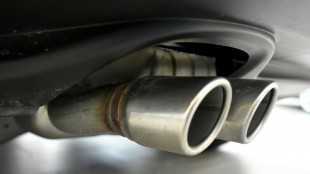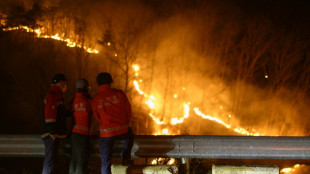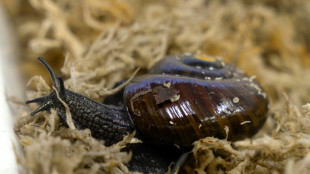
-
 Putin evokes WWII victory to rally Russia behind Ukraine offensive
Putin evokes WWII victory to rally Russia behind Ukraine offensive
-
China exports beat forecasts ahead of US tariff talks

-
 Leo XIV, the 'Latin Yankee', to celebrate first mass as pope
Leo XIV, the 'Latin Yankee', to celebrate first mass as pope
-
Most stocks lifted by hopes for US-China talks after UK deal

-
 IPL suspended indefinitely over India-Pakistan conflict: reports
IPL suspended indefinitely over India-Pakistan conflict: reports
-
German lender Commerzbank's profits jump as it fends off UniCredit

-
 Rare bone-eroding disease ruining lives in Kenya's poorest county
Rare bone-eroding disease ruining lives in Kenya's poorest county
-
India says repulsed fresh Pakistan attacks as de-escalation efforts grow

-
 Zhao's historic snooker title sparks talk of China world domination
Zhao's historic snooker title sparks talk of China world domination
-
'High expectations': EU looks to Merz for boost in tough times

-
 Poisoned guests rarely invited before deadly mushroom lunch, Australia trial hears
Poisoned guests rarely invited before deadly mushroom lunch, Australia trial hears
-
China sales to US slump even as exports beat forecasts

-
 Indian cricket to make 'final decision' on IPL over Pakistan conflict
Indian cricket to make 'final decision' on IPL over Pakistan conflict
-
Dethroned Bundesliga champions Leverkusen face uncertain future

-
 China can play hardball at looming trade talks with US: analysts
China can play hardball at looming trade talks with US: analysts
-
French monuments in trouble while PSG prepare for Champions League final

-
 Newcastle face Chelsea in top five showdown, Alexander-Arnold in spotlight
Newcastle face Chelsea in top five showdown, Alexander-Arnold in spotlight
-
Flick's Barca must show 'hunger' in crunch Liga Clasico

-
 Clasico the last chance saloon for Ancelotti's Real Madrid
Clasico the last chance saloon for Ancelotti's Real Madrid
-
Timberwolves overpower Warriors to level series

-
 Chinese fabric exporters anxious for US trade patch-up
Chinese fabric exporters anxious for US trade patch-up
-
Putin gears up to host world leaders at lavish army parade

-
 Nearing 100, Malaysian ex-PM Mahathir blasts 'old world' Trump
Nearing 100, Malaysian ex-PM Mahathir blasts 'old world' Trump
-
Leo XIV, first US pope, to celebrate first mass as pontiff

-
 Asian stocks lifted by hopes for US-China talks after UK deal
Asian stocks lifted by hopes for US-China talks after UK deal
-
Former head of crypto platform Celsius sentenced 12 years

-
 Ex-model testifies in NY court that Weinstein assaulted her at 16
Ex-model testifies in NY court that Weinstein assaulted her at 16
-
Nestlé and OMP Showcase Approach to Future-Ready Supply Chain at Gartner Supply Chain Symposium/Xpo in Barcelona

-
 Genflow Biosciences PLC Announces Share Subscription, Director's Dealing and Update
Genflow Biosciences PLC Announces Share Subscription, Director's Dealing and Update
-
Argo Blockchain PLC Announces 2024 Annual Results and Restoration of Listing

-
 'Great honor': world leaders welcome first US pope
'Great honor': world leaders welcome first US pope
-
Pacquiao to un-retire and fight Barrios for welterweight title: report

-
 Trump unveils UK trade deal, first since tariff blitz
Trump unveils UK trade deal, first since tariff blitz
-
Man Utd one step away from Europa League glory despite horror season

-
 Jeeno shines on greens to grab LPGA lead at Liberty National
Jeeno shines on greens to grab LPGA lead at Liberty National
-
Mitchell fires PGA career-low 61 to grab Truist lead

-
 AI tool uses selfies to predict biological age and cancer survival
AI tool uses selfies to predict biological age and cancer survival
-
Extremely online new pope unafraid to talk politics

-
 Postecoglou hits back as Spurs reach Europa League final
Postecoglou hits back as Spurs reach Europa League final
-
Chelsea ease into Conference League final against Betis

-
 Pope Leo XIV: Soft-spoken American spent decades amid poor in Peru
Pope Leo XIV: Soft-spoken American spent decades amid poor in Peru
-
First US pope shared articles critical of Trump, Vance

-
 'Inexcusable' - NBA champs Boston in trouble after letting big leads slip
'Inexcusable' - NBA champs Boston in trouble after letting big leads slip
-
US automakers blast Trump's UK trade deal

-
 Stocks mostly rise as US-UK unveil trade deal
Stocks mostly rise as US-UK unveil trade deal
-
Trump presses Russia for unconditional 30-day Ukraine ceasefire

-
 Anything but Europa League glory 'means nothing' for Man Utd: Amorim
Anything but Europa League glory 'means nothing' for Man Utd: Amorim
-
'Inexcuseable' - NBA champs Boston in trouble after letting big leads slip

-
 Pope Leo 'fell in love with Peru'and ceviche: Peru bishop
Pope Leo 'fell in love with Peru'and ceviche: Peru bishop
-
Pakistan's T20 cricket league moved to UAE over India conflict


Ailing oceans in state of 'emergency', says UN chief
A long-delayed conference on how to restore the faltering health of global oceans kicked off in Lisbon on Monday, with the head of the UN saying the world's seas are in crisis.
"Today we face what I would call an ocean emergency," UN Secretary General Antonio Guterres told thousands of policymakers, experts and advocates at the opening plenary, describing how seas have been hammered by climate change and pollution.
Humanity depends on healthy oceans.
They generate 50 percent of the oxygen we breathe and provide essential protein and nutrients to billions of people every day.
Covering 70 percent of Earth's surface, oceans have also softened the impact of climate change for life on land.
But at a terrible cost.
Absorbing around a quarter of CO2 pollution -- even as emissions increased by half over the last 60 years -- has turned sea water acidic, threatening aquatic food chains and the ocean's capacity to absorb carbon.
And soaking up more than 90 percent of the excess heat from global warming has spawned massive marine heatwaves that are killing off precious coral reefs and expanding dead zones bereft of oxygen.
"We have only begun to understand the extent to which climate change is going to wreak havoc on ocean health," said Charlotte de Fontaubert, the World Bank's global lead for the blue economy.
Making things worse is an unending torrent of pollution, including a garbage truck's worth of plastic every minute, according to the United Nations Environment Programme (UNEP).
On current trends, yearly plastic waste will nearly triple to one billion tonnes by 2060, according to a recent report by the Organisation for Economic Cooperation and Development (OECD).
- Wild fish stocks -
Microplastics -- now found inside Arctic ice and fish in the ocean's deepest trenches -- are estimated to kill more than a million seabirds and over 100,000 marine mammals each year.
Solutions on the table range from recycling to global caps on plastic production.
Global fisheries will also be in the spotlight during the five-day UN Ocean Conference, originally slated for April 2020 and jointly hosted by Portugal and Kenya.
"At least one-third of wild fish stocks are overfished and less than 10 percent of the ocean is protected," Kathryn Matthews, chief scientist for US-based NGO Oceana, told AFP.
"Destructive and illegal fishing vessels operate with impunity in many coastal waters and on the high seas."
One culprit is nearly $35 billion in subsidies. Baby steps taken last week by the World Trade Organization (WTO) to reduce handouts to industry will hardly make a dent, experts said.
The conference will also see a push for a moratorium on deep-sea mining of rare metals needed for a boom in electric vehicle battery construction.
Scientists say poorly understood seabed ecosystems are fragile and could take decades or longer to heal once disrupted.
Another major focus will be "blue food", the new watchword for ensuring that marine harvests from all sources -- wild caught and farmed -- are sustainable and socially responsible.
- Protected areas -
Aquaculture yields -- from salmon and tuna to shellfish and algae -- have grown by three percent a year for decades and are on track to overtake wild marine harvests that peaked in the 1990s, with each producing roughly 100 million tonnes per year.
The Lisbon meeting will be attended by ministers and even a few heads of state, including French President Emmanuel Macron, but is not a formal negotiating session.
But participants will push for a strong oceans agenda at two critical summits later this year -- the COP27 UN climate talks in November, hosted by Egypt, followed by the long-delayed COP15 UN biodiversity negotiations, recently moved from China to Montreal.
Oceans are already at the heart of a draft treaty tasked with halting what many scientists fear is the first "mass extinction" event in 65 million years. A cornerstone provision would designate 30 percent of the planet's land and ocean as protected areas.
But preparatory negotiations in Nairobi ended on Sunday in deadlock.
"The agreement is at risk of collapsing on the question of finance," the environmental diplomacy lead for WWF France told AFP.
For climate change, the focus will be on carbon sequestration -- boosting the ocean's capacity to soak up CO2, whether by enhancing natural sinks such as mangroves or through geoengineering schemes.
At the same time, scientists warn, a drastic reduction in greenhouse gases is needed to restore ocean health.
A.Rodriguezv--AMWN



